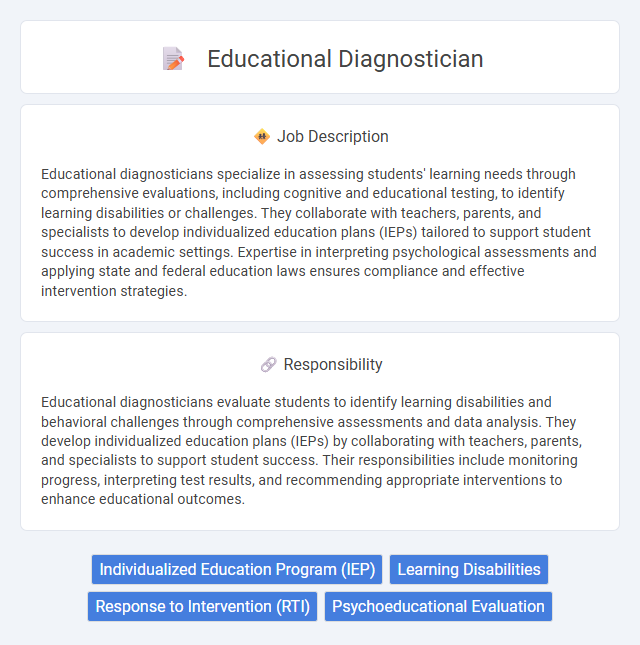
Educational diagnosticians specialize in assessing students' learning needs through comprehensive evaluations, including cognitive and educational testing, to identify learning disabilities or challenges. They collaborate with teachers, parents, and specialists to develop individualized education plans (IEPs) tailored to support student success in academic settings. Expertise in interpreting psychological assessments and applying state and federal education laws ensures compliance and effective intervention strategies.
Individuals with strong analytical skills and a patient, empathetic nature may be well-suited for the role of an educational diagnostician. Those who thrive in structured environments and possess a deep understanding of learning disabilities and assessment techniques could likely find success in this career. People who struggle with attention to detail or lack interest in educational psychology might not be an ideal fit for this specialized position.
Qualification
An educational diagnostician typically requires a master's degree in special education, school psychology, or a related field, along with state certification or licensure specific to educational diagnostics. Proficiency in administering and interpreting psychoeducational assessments, knowledge of learning disabilities, and experience in developing individualized education programs (IEPs) are essential qualifications. Strong communication skills and collaboration with teachers, parents, and school staff further enhance effectiveness in this specialized role.
Responsibility
Educational diagnosticians evaluate students to identify learning disabilities and behavioral challenges through comprehensive assessments and data analysis. They develop individualized education plans (IEPs) by collaborating with teachers, parents, and specialists to support student success. Their responsibilities include monitoring progress, interpreting test results, and recommending appropriate interventions to enhance educational outcomes.
Benefit
The role of an educational diagnostician likely offers significant benefits such as enhancing student learning outcomes through targeted assessments and interventions. This job may also provide the opportunity to collaborate with educators and families, fostering a supportive educational environment. Career growth and continual professional development seem probable due to the specialized nature of the position.
Challenge
Working as an educational diagnostician likely involves the challenge of accurately identifying diverse learning disabilities and developmental delays in students with varying needs. The role probably requires balancing comprehensive assessments with limited time and resources, making precise evaluations complex. Navigating collaboration with educators, parents, and specialists might also present difficulties in ensuring effective intervention plans.
Career Advancement
Educational diagnosticians can advance their careers by obtaining specialized certifications such as the Nationally Certified School Psychologist (NCSP) credential or pursuing a master's or doctoral degree in school psychology or special education. Gaining experience in diverse educational settings and developing expertise in data analysis, intervention strategies, and legal regulations enhances opportunities for leadership roles, including supervisory positions or consultancy roles within school districts. Continuing professional development and staying current with educational policies and assessment technologies further supports career progression and increased earning potential.
Key Terms
Individualized Education Program (IEP)
Educational diagnosticians play a crucial role in developing and implementing Individualized Education Programs (IEPs) by conducting comprehensive assessments to identify students' learning needs. They collaborate with educators, parents, and specialists to design tailored educational plans that address cognitive, emotional, and developmental challenges. Expertise in interpreting psychological evaluations, academic performance data, and behavioral observations ensures that the IEP promotes effective interventions and supports student success.
Learning Disabilities
Educational diagnosticians specialize in identifying and assessing learning disabilities in students through comprehensive evaluations using standardized tests and observational data. They develop individualized education plans (IEPs) and collaborate with teachers, parents, and other professionals to implement effective intervention strategies that address cognitive, emotional, and academic challenges. Expertise in special education laws, such as the Individuals with Disabilities Education Act (IDEA), ensures compliance and promotes equitable learning opportunities for students with diverse learning needs.
Response to Intervention (RTI)
Educational diagnosticians play a crucial role in the Response to Intervention (RTI) framework by assessing student learning challenges and guiding targeted interventions. They analyze data from multiple RTI tiers to identify students requiring specialized support and collaborate with educators to design evidence-based strategies. Their expertise ensures early identification and effective remediation, improving academic outcomes for diverse learners.
Psychoeducational Evaluation
Educational diagnosticians specialize in conducting psychoeducational evaluations to assess students' cognitive, academic, and social-emotional functioning. These evaluations utilize standardized tests, observations, and interviews to identify learning disabilities, developmental delays, and giftedness, informing individualized education plans (IEPs). Expertise in interpreting assessment data enables educational diagnosticians to provide actionable recommendations for targeted interventions and support services in academic settings.
 kuljobs.com
kuljobs.com